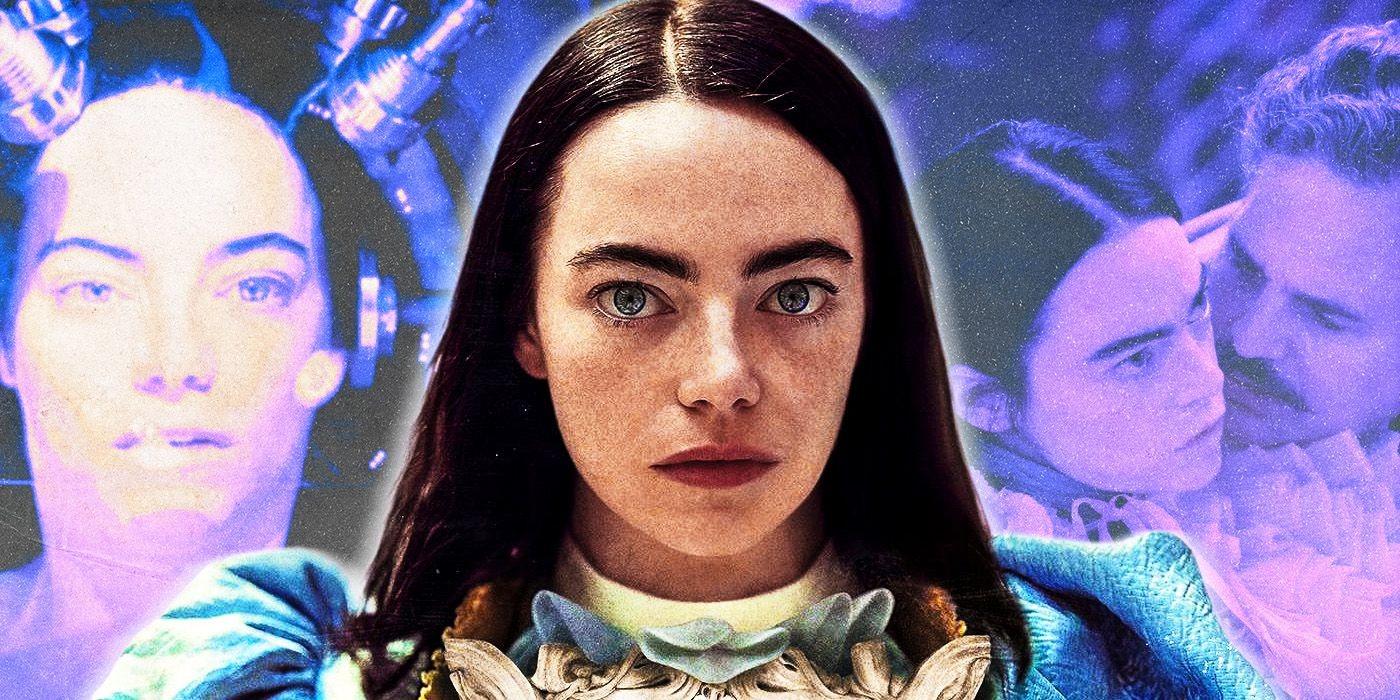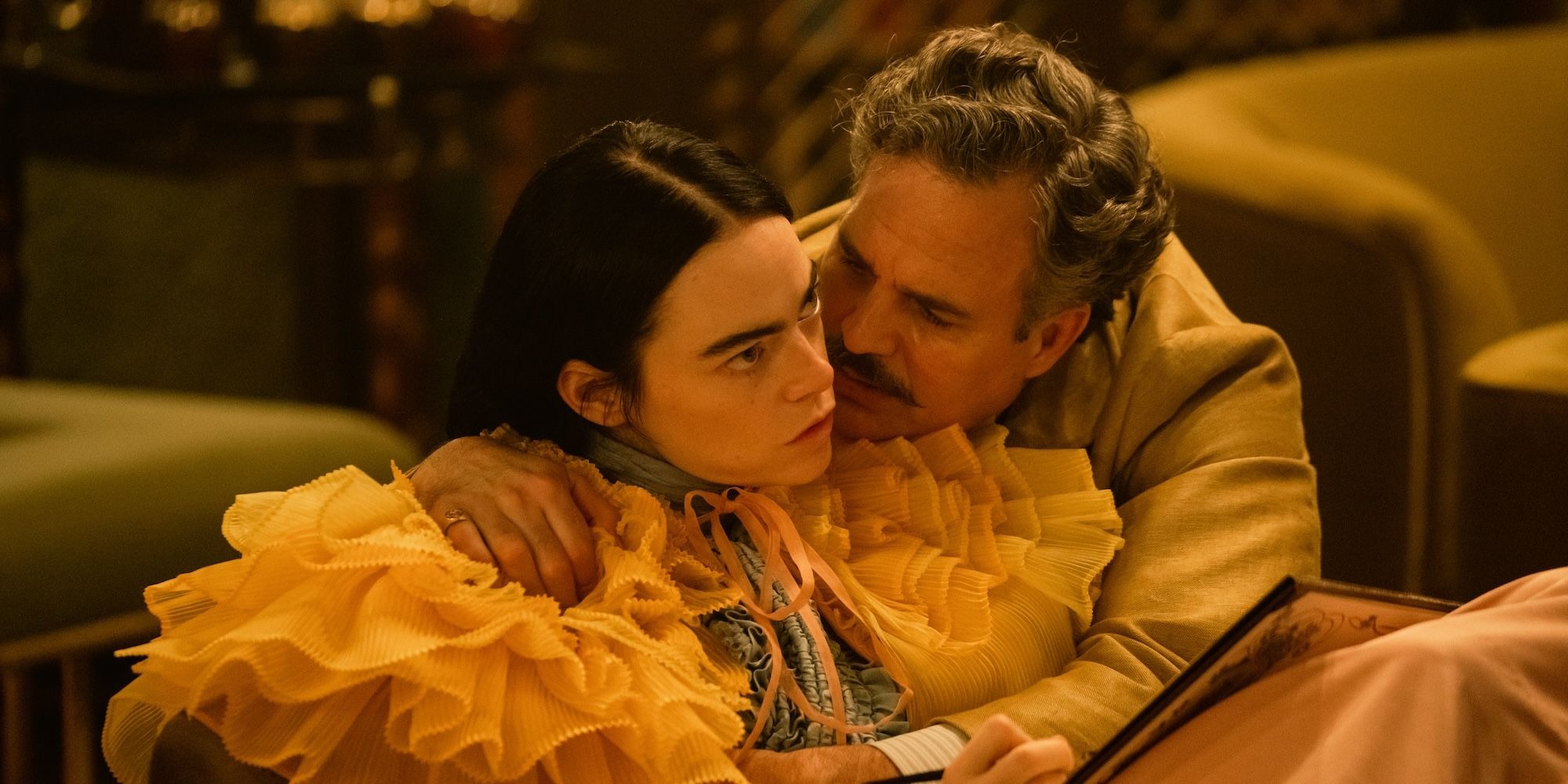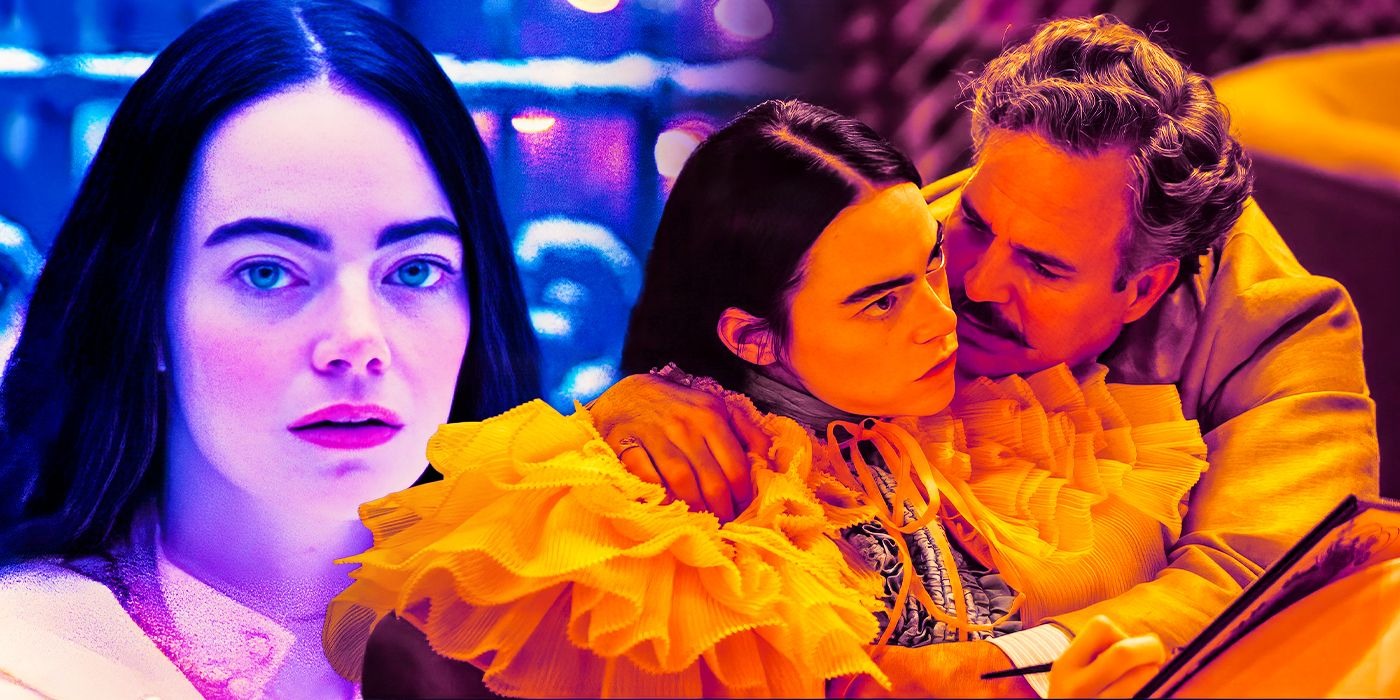After the death of Godwin, Bella ends up staying at his estate, now fully embracing her new life. Her story, told through Poor Things, presents her journey from being a scientific experiment to developing into an independent woman who gains a deeper insight into human behavior through several personal experiences.
As the film nears its conclusion, Bella breaks free from Alfie Blessington’s control after initially changing her mind about getting married to Max. However, she soon becomes irritated by Alfie’s attempts to dominate her.

When she realizes she’s not free and desires to leave, Bella ends up shooting Alfie in the leg and takes him along with her back home. With Godwin no longer alive, she carries out her first major medical experiment—she replaces Alfie’s brain with that of a goat.
By the film’s last scene, Bella seems to have found her version of fulfillment, staying at Godwin’s estate with Max, Felicity (another of Godwin’s creations), and Toinette, her friend from her time in a Paris brothel. Duncan is nowhere around, and this marks Bella’s next phase of self-discovery.
Understanding Godwin’s Experiment & Bella’s Origin
Bella was more than just a product of science. What led to Bella’s creation was partly Godwin’s loneliness and desire for companionship. Dr. Godwin Baxter, having been experimented on by his father, never set out to create someone like Bella initially.
But upon finding Victoria’s body near death after she jumped off a bridge, he saw a rare opportunity. He placed the mind of her unborn baby inside the grown body, finding the chance to observe this process up close.
Godwin was driven by more than scientific ambition. He lacked emotional bonds due to his cruel upbringing and sought a meaningful relationship. Bella brought him that warmth. As she began to develop mentally and emotionally, Godwin became attached to her, viewing her more like a daughter than a test subject.
Her quick learning and zest for knowledge made him happy, and for the first time, he experienced the affection that was denied him earlier in life. While he could relate to her on some level due to his past, Bella’s presence transformed him emotionally, offering him a sense of direction that went beyond science.
Why Bella Chose Alfie Over Max On Her Wedding Day
Alfie remained the only connection Bella had to her former self. Although Bella seemed ready to settle down with Max, her intense curiosity and hunger for understanding more about herself had not ended. She wanted truth, especially since she had grown up surrounded by lies.
When Alfie Blessington showed up on the day of her wedding, she didn’t hesitate to leave with him, hoping to get answers about her previous life as Victoria—a side of herself she hadn’t fully understood yet. Bella may also have had doubts about marrying Max from the beginning.
She had left him before to pursue other relationships and discover more about life. Choosing Alfie at that moment might have come from the belief that he could offer something more unpredictable or revealing, even though she wasn’t planning to stay with him permanently.
Whether Bella Ends Up With Max After Everything
The film does not provide a final answer on Bella and Max’s future as a couple. Bella’s love story remains unresolved by the closing scenes of Poor Things. Though she left Max at the altar to go with Alfie, there’s no clear confirmation that she returned to Max in a romantic sense after escaping from Alfie.
Even though they’re seen living peacefully at the estate together, the film doesn’t reveal if marriage is still in their plans. Their relationship seems affectionate and harmonious, but formal commitment remains uncertain.
Her past interactions with Duncan and Alfie may have reshaped her view of relationships. She may have realized she and Max can remain close without needing marriage, or perhaps she values their bond more as friends who care deeply for one another.
Why Duncan Reintroduced Bella to Alfie Even Though He Wanted Her
Duncan’s motives were rooted in control, not love. Though Duncan and Bella initially seemed happy together, things changed when he began trying to dominate her decisions. Once she left him, Duncan struggled to accept her rejection. Despite still desiring her, he couldn’t handle her independence.
Reconnecting her with Alfie Blessington was Duncan’s way of getting back at her, hoping that Alfie’s controlling nature would make Bella suffer. Duncan was aware that Bella had a life as Victoria before she met him, and he knew bringing Alfie back into her life would stir pain.
He expected Alfie to treat her poorly and hoped this would make Bella regret leaving him. Duncan wanted her to feel lost without him, thinking she would eventually recognize that she had it better with him. This act wasn’t about helping Bella—it was about hurting her because his pride was bruised.
What Bella’s Decision To Become A Doctor Means
Towards the end of Poor Things, Bella makes an important life choice. After spending time on the cruise and witnessing various forms of suffering and unfairness in society, Bella reaches a point where she wants to contribute meaningfully to the world.
She decides to become a doctor, a move that would let her continue Godwin’s work and help people in her way. This path would also give her the space to continue conducting medical experiments like the one she performed on Alfie.
Her successful operation shows her capability, and choosing to pursue medicine means Bella wants to take control of her future, mixing her compassion with her scientific curiosity.
Victoria Blessington’s Life Before She Became Bella
Before Godwin brought her back to life, Bella had been Victoria Blessington. The life Victoria lived before becoming Bella was full of wealth and social status. Alongside Alfie, she reportedly mistreated her staff for sport.
Unlike Bella, who became eager to learn and experience life in its fullness, Victoria seemed content with high-society routines. However, things began to change when she became pregnant. She despised the unborn child and started feeling imprisoned—possibly by the expectations of motherhood and the structure of her existence.
Since this background is shared from Alfie’s point of view, some details may be skewed or incomplete. Still, being brought back as Bella gave Victoria a second chance at life, free from the chains that once held her back.
What Yorgos Lanthimos Said About Bella’s Ending
Bella’s fate in Poor Things turned out better than many people expected. The final act of Poor Things was different from what some thought it would be, especially given that Yorgos Lanthimos’ other works rarely end on a cheerful note.
Yet despite all the events and dramatic turns, Bella always remained the central figure whose presence shaped the direction of the film. Director Lanthimos and writer Tony McNamara mentioned that it was Bella’s journey and nature that shaped the story’s closing moments.
During their discussion with Polygon, they explained that staying true to Bella’s experience meant committing to a kind of positive outlook on life’s journey. That perspective influenced their decision to let Bella have a brighter ending than what people usually expect from such films.
How the Film Version of Poor Things Differs From the Original Book
The film version of Poor Things is based on Alasdair Gray’s 1992 novel. The movie adapts the story from Alasdair Gray’s book but makes several changes to how events play out.

In the original story, Bella is already married to Max—named Archibald McCandless in the novel—and she does not have the same close relationship with Dr. Godwin Baxter. It is Archibald who informs Bella of her background and the experimentation involved in her existence.
Although Bella initially doubts what Archibald tells her, she later ends up with Duncan. In the book, she also travels farther than in the film, visiting places like Central Asia and various parts of Europe besides France. Poor Things marks the first time Gray’s story has been adapted for the big screen.
Comparing Poor Things With Mary Shelley’s Frankenstein
There’s a strong influence from Frankenstein in Poor Things. Yorgos Lanthimos’ film shares similarities with Mary Shelley’s Frankenstein, especially in the way it tackles Victorian themes and questions about life, science, and identity.
While Frankenstein presents a warning about unchecked scientific ambition and society’s response to those who are different, Poor Things offers a broader discussion that includes gender identity and feminist thought. Bella’s journey, shaped by her experiences as a woman, highlights issues that Frankenstein does not fully touch on.
Throughout her story, different men attempt to control or shape Bella’s thinking to serve their interests. While Poor Things takes a more satirical approach, both it and Frankenstein raise the same core questions about life, death, and existence.
However, Bella’s situation provides a deeper lens on how society treats women, especially those seen as different or those who refuse to be controlled.



